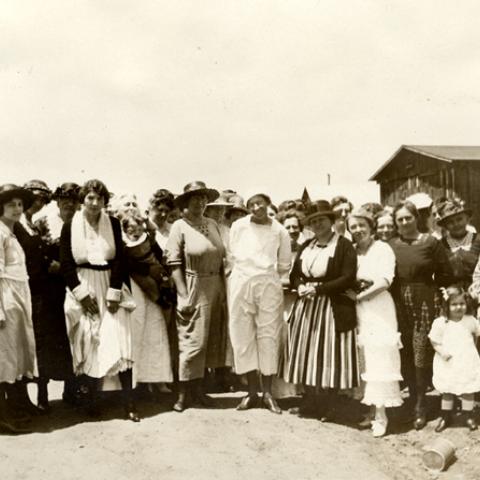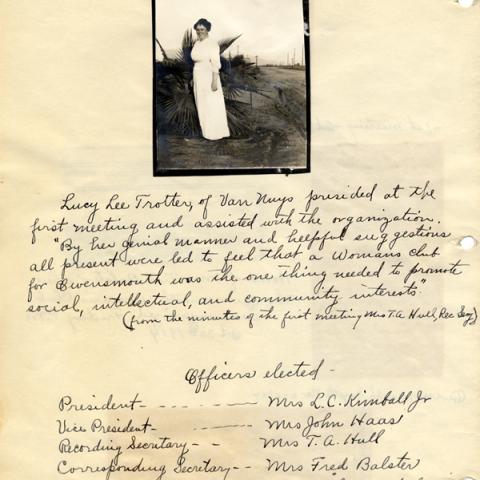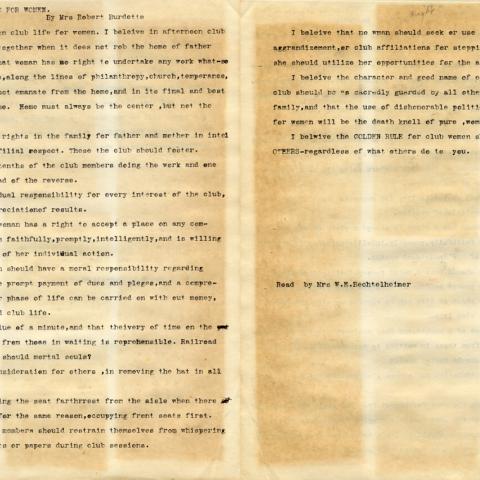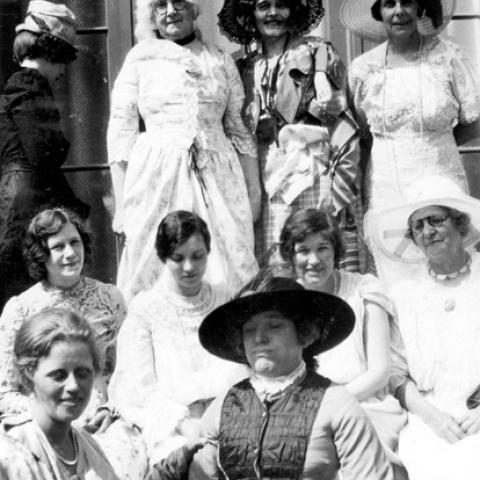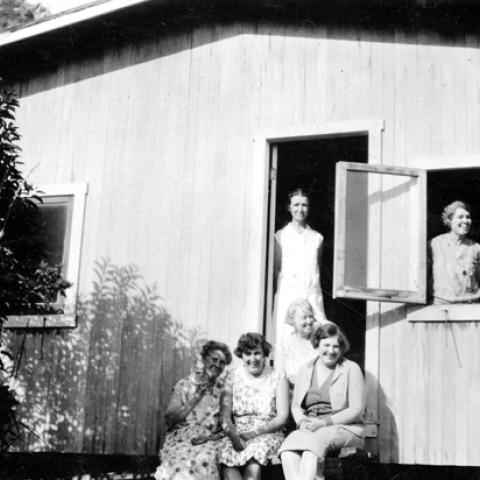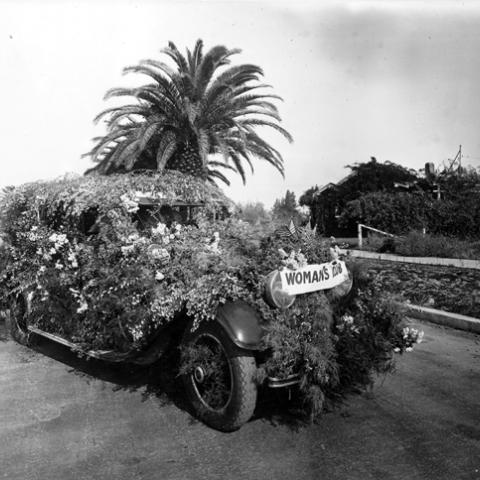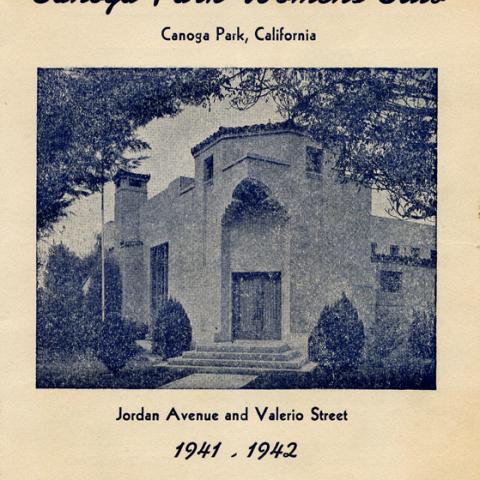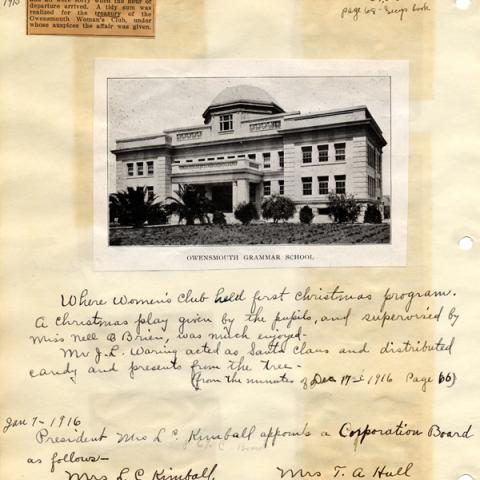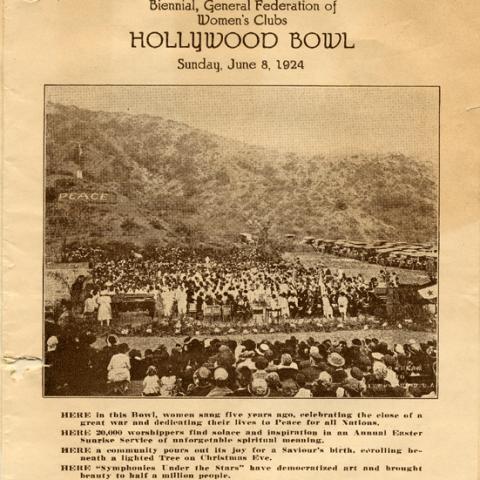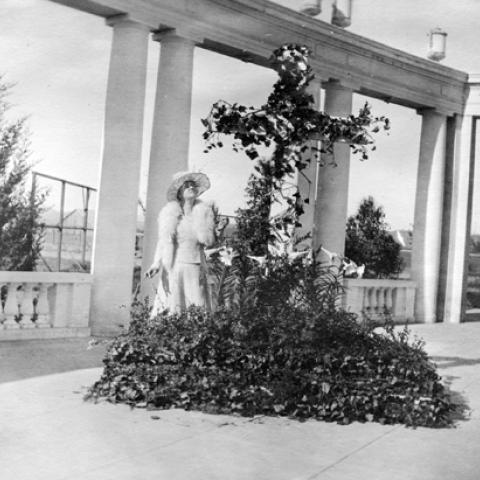Canoga Park Women's Club Collection
September 12, 2017
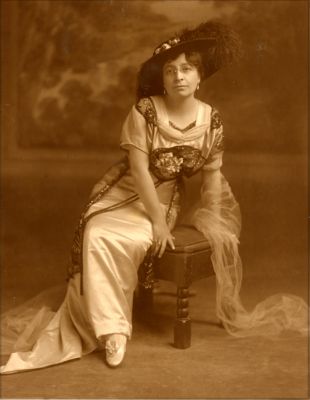 The woman's club movement was a social movement in the 19th and early 20th centuries in the United States. The first wave during the Progressive era was started by white, middle-class women, and a later phase was led by African-American women. While most began as social or literary clubs, they eventually began working towards social reform, taking on such issues as child labor, juvenile justice, legal reform, environmental protection, library creation, temperance, and more. Special Collections and Archives holds a number of women's clubs collections, including the Canoga Park Women's Club Collection.
The woman's club movement was a social movement in the 19th and early 20th centuries in the United States. The first wave during the Progressive era was started by white, middle-class women, and a later phase was led by African-American women. While most began as social or literary clubs, they eventually began working towards social reform, taking on such issues as child labor, juvenile justice, legal reform, environmental protection, library creation, temperance, and more. Special Collections and Archives holds a number of women's clubs collections, including the Canoga Park Women's Club Collection.
On October 30, 1914, the Owensmouth Women's Club met for the first time. After electing officers, club members formed a new committee to draw up the organization’s Constitution and By-Laws. In 1915, the Owensmouth Women’s Club became the youngest organization admitted to the California Federation of Women’s Clubs, ultimately becoming incorporated in 1916. The 1916 Constitution and By-laws of the Owensmouth Women’s Club states, "The purpose of this club is to promote interest in intellectual pursuits; to become a center for broader social life and to work unitedly for the general advancement of both club and community." The town of Owensmouth had been established in the Western part of the San Fernando Valley in 1912, but renamed Canoga Park in 1931, and the club followed suit by changing its name as well.
One of the first issues to come before the Canoga Park Women’s Club was the establishment of the Owensmouth Free Public Library. The 150-book library soon grew from donations made by club members. Beautification of Canoga Park also became a theme for the clubwomen, who planted Catalpa Trees and held horticulture events at Orcutt Rancho on Roscoe Boulevard. The annual Catalpa Princess was selected at Canoga Park High School, with participants selected from neighboring San Fernando Valley communities. The Queen was later crowned at Orcutt Rancho in May. Several newspaper clippings depict competing princesses and clubwomen breaking ground for Arbor Day Catalpa tree planting events. Canoga Park clubwomen also participated in Pennies for Pines, and worked tirelessly to reforest national parks.
Canoga Park Women’s Club meetings were a combination of business and a variety of educational programs including police talks, gardening in the Valley, women’s work, culture, fashion, films, relief, wildflowers and native plants, holiday fetes, and arts and crafts demonstrations. An Egyptologist gave a lecture about her travels and showed relics, including a mummy’s hand. Field trip events to the Greek Theater, LA Philharmonic, and the Hollywood Bowl were often and quite well attended.
The Club supported a variety of philanthropic endeavors during WWII. Club mottos like "Strength United is Stronger,” for the 1941-1942 club presidency featured patriotic themes. A watermelon party was held in July of 1942 at the United Services Organization (USO) where a pool table was presented to soldiers with money that had been raised by clubwomen. Lark Day ushered in the spring gardening season. A charitable component at each event helped support community libraries, health organizations, and the Guadalupe Youth Center, which was a favorite of the Canoga Park clubwomen.
In 1976, the Canoga Park Women's Club established Haven Hills, the first shelter in the San Fernando Valley for battered women and their children. In the 1980s, the organization established the Canoga-Owensmouth Historical Society, the Canoga Park Friends of the Library, and worked to support a community historical museum. Today, the Canoga Park Women's Club operates as a non-profit philanthropic organization. The Canoga Park Women’s Club Collection consists of notebooks, scrapbooks, photographs, invitations, correspondence, newsletters, ephemera, minutes, financial statements, committee reports, and biographical information of club leadership.
Image Gallery
Post tagged as: urban archives, scrapbooks, correspondence, photographs, publications, san fernando valley
Read more Peek in the Stacks blog entries